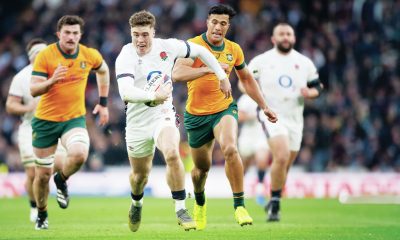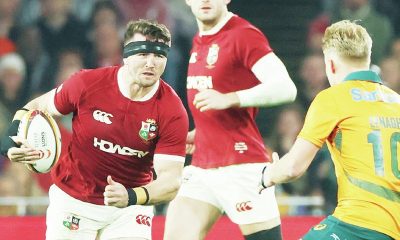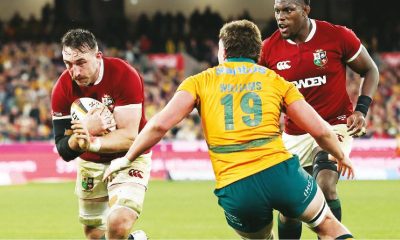 Wales are a dangerous side if they bring their best game to Cardiff on Saturday against England because they have ability man-for-man in their backline. When I look at a line-up that reads Mike Phillips, Jamie Roberts, Jonathan Davies, George North, Alex Cuthbert and Leigh Halfpenny, how can they not be a threat every time they go on the field?
Wales are a dangerous side if they bring their best game to Cardiff on Saturday against England because they have ability man-for-man in their backline. When I look at a line-up that reads Mike Phillips, Jamie Roberts, Jonathan Davies, George North, Alex Cuthbert and Leigh Halfpenny, how can they not be a threat every time they go on the field?
The Welsh backs may have also looked a bit more predictable and one-dimensional in this Six Nations than they did last season on their way to a Grand Slam, and played only in spurts – but the second-half against Ireland, the last 20 minutes against France, and a few flashes in the grinding game against Italy, has shown what they are capable of.
By comparison, when I look at England, apart from Manu Tuilagi, where’s the threat? Who would I be worried to let go on my outside shoulder? It wouldn’t be Alex Goode or Mike Brown. Maybe Chris Ashton. But the beauty of this England backline, and of the team as a whole, is their collective strength. The sum of the parts is much stronger than the individual components.
Stuart Lancaster is happy with his back three because Brown and Goode return anything which is kicked to them with interest. If the England coach put a Christian Wade, Charlie Sharples, Jonny May or Tom Varndell into this team then he would diminish that kicking game. With Brown and Goode at the back, and England’s fitness as a side, finding ways to attack them is not easy.
If Wales kick deep then they stand a chance of losing territory and possession from the kick returns of the English back three.
Halfpenny is the only member of the Welsh back three who is an accomplished kicker from hand, and that is why North and Cuthbert will probably look to run it back.
England will anticipate being able to stop them on the gain-line, and apply pressure of their own – so the crucial question will be whether Wales are good enough to play with the ball in hand from kick receiving, and dominate England.
It is a tough call, and so far no one has managed it in this tournament. However, if the Welsh runners beat the first-up defender, as France’s Wesley Fofana did, and get behind the English defensive line, then there are few teams more dangerous.
Until now Wales have butchered as many opportunities as they have put away, and although they are getting better I am not convinced they will face an England side which is overawed by being in a Grand Slam shoot-out.
It’s often the case that the nearer teams get to winning big prizes the more they tighten-up, becoming unable to play their natural game. I don’t see this England side suffering that fate, because they have already shown the ability to adapt – especially when opponents have tried to stop them getting quick ball.
International rugby is a game of chess, and if you don’t get quick ball the obvious option is to kick it. Why risk running the ball in your own half off slow ball when, more often than not, it will cost you points? New Zealand don’t mess around with the ball in their own half, and if they do get quick ball in their own territory they generally attack by kicking and chasing. That doesn’t mean to say that they never run the ball from deep, but they only do it when they know that the defence is out of position, and they take off with a couple of quick passes. England have taken a leaf out of that book.
This season England have shown they are better at winning quick ball and creating momentum than Wales, and it has been reflected in the way they have performed. Ultimately, England’s Grand Slam grail will be dictated by whether they get quick ball in Cardiff. Against New Zealand and Scotland they dominated the breakdown, but against France they got a big scare.
The French forwards, with Thierry Dusautoir and Yannick Nyanga leading the way, latched on to the English carriers quickly, and the clean-out was less effective, especially before half-time. However, in the second half, England worked it out by raising the tempo and playing a quicker, harder game.
If you blast everything aside at a breakdown the momentum you generate keeps rolling through the phases, and it means that your half-backs can sit in the armchair and pick their targets. The options are endless – and as England showed against New Zealand and Scotland, they can use quick ball very well and score tries.
The Six Nations is a brave place in which to experiment, and England are not experimenting. All the changes against Italy are understandable, and they will anticipate that the Italians will compete hard for 40 minutes. However, after that it’s almost a countdown to when they break.
England will not change their pattern or style as they fight to win a Grand Slam, and quick ball will remain their quest.

1 Comment
You must be logged in to post a comment Login
Leave a Reply
Cancel reply
Leave a Reply
You must be logged in to post a comment.































Pingback: Where to buy weed online in europe